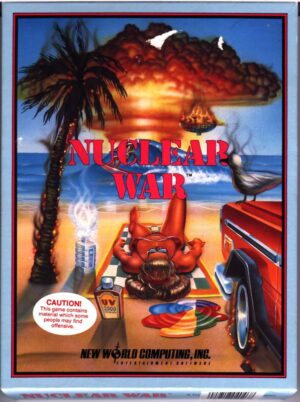Retro Replay Review
Gameplay
Druglord delivers a surprisingly deep financial simulation under the guise of a straightforward text-based interface. You begin with $500 in one of eight major U.S. cities—Chicago, Detroit, Las Vegas, Los Angeles, Miami, New York, San Diego, or Washington D.C.—and immediately face the core challenge: turning a profit by buying and selling eight types of drugs, from low-cost Ludes all the way up to high-value Cocaine. Each city visit presents shifting street prices, with occasional one-time events like factory explosions or police sweeps that can spike or crash a particular drug’s value. This forces you to weigh the risk of staying put for a quick margin against hopping to another city in search of better deals.
(HEY YOU!! We hope you enjoy! We try not to run ads. So basically, this is a very expensive hobby running this site. Please consider joining us for updates, forums, and more. Network w/ us to make some cash or friends while retro gaming, and you can win some free retro games for posting. Okay, carry on 👍)
Beyond simple buy-low, sell-high tactics, Druglord layers in several risk-management mechanics that keep you on your toes. You can stash cash in the bank to avoid losing it in a robbery, but accessing your funds takes time—and if you fall behind on a loan shark’s payment schedule, you’ll face violent “reminders” to settle your debt. To up your hauling capacity, you can purchase overcoats that expand your holding limits, but this expense also cuts into your capital. Each decision—how much to invest in stock versus banking, whether to bribe or confront cops, and how much reputation you’re willing to amass—feeds into an intricate tug-of-war between profit and peril.
Reputation serves as a double-edged sword in Druglord. A higher reputation unlocks the ability to bring along backup when clashing with law enforcement, but it also means more frequent and larger police confrontations. You can attempt to fight your way out, using friends to tip the odds in your favor, or make a run for it—though escape becomes near impossible against overwhelming forces. Shootouts add an element of high-stakes tension, while hasty getaways risk forfeiting all your hard-earned gains. This balance of earning reputation versus avoiding unwanted attention adds a strategic layer missing from simpler economic sims.
Graphics
True to its retro inspiration, Druglord features no graphical assets beyond plain text on your monitor. You won’t find animated cityscapes or colorful HUD elements; instead, economic data, menu options, and event descriptions flash in crisp, blocky characters that evoke early ’80s PC gaming. The lack of visuals directs your focus squarely onto numbers, probabilities, and the emergent stories your own decisions create. For players who relish old-school interfaces, this minimalist presentation only heightens the sense of operating in a gritty underworld economy.
The text-driven display may feel austere to those accustomed to modern UI flourishes, but its clarity is a strength. Price listings, inventory counts, bank balances, and reputation scores are all laid out in tidy columns. Alerts about street raids, loan shark visits, and police actions pop up with concise descriptions that demand immediate attention. With no distracting animations, every line of text carries weight—so you quickly learn to read between the lines and anticipate market swings or law-enforcement crackdowns.
While some might consider the absence of any graphical flair a disadvantage, Druglord turns this constraint into an immersive feature. Your imagination fills in the blanks: you picture neon-lit Las Vegas streets or the gritty alleyways of Detroit as you pore over fluctuating drug prices. In an era when memory was scarce and processing power limited, this text-only design allowed for complex simulation under the hood—something that remains impressive even by today’s standards.
Story
Druglord doesn’t follow a traditional narrative with scripted cutscenes or predefined characters; instead, it offers an emergent storyline built from player choices and random events. Each game session becomes a unique crime saga: maybe you’ll rise from modest street peddler to feared kingpin, or perhaps you’ll watch your empire crumble under heavy police pressure or a ruthless debt collector’s threat. Your personal tale of risk, reward, and occasional desperation is the real story here.
Though there’s no voiced dialogue or elaborate plot arcs, the reputation system provides dramatic tension. Taking down a rival dealer in a police shootout or narrowly escaping a massive raid gives you bragging rights—and a visceral sense of progression. Street raids and factory explosions function like narrative beats, punctuating the financial grind with moments of crisis that test your adaptability. These random events, while mechanically simple, create memorable highs and lows that keep you invested in your own saga.
In lieu of character development, Druglord leans on the inherent drama of illicit enterprise. Every decision—from investing in overcoats to staging a last-minute getaway—feels consequential. The lack of a linear plot actually broadens the game’s replayability, as each run spawns a fresh, player-driven narrative. You may play again simply to see how far you can climb, how large your operation can grow, and how you navigate the ever-present threat of law enforcement.
Overall Experience
Druglord shines as a focused financial-strategy game that demands careful planning, adaptability, and a healthy tolerance for risk. Its text-only interface and simple mechanics belie a surprisingly rich simulation: dynamic drug markets, banking and loan-shark systems, reputation-driven police encounters, and random events all coalesce into a challenging puzzle. If you’re seeking fast-paced action, you might find the pacing leisurely at first, but the strategic undercurrents quickly reveal themselves as you learn to read market trends and manage law-enforcement pressure.
As a niche title rooted in early PC gaming tradition, Druglord won’t appeal to everyone. Modern gamers seeking high-fidelity visuals or cinematic storytelling may find its text-based approach quaint or even off-putting. Yet for fans of retro economic sims and players who appreciate pure strategy without graphical distractions, it offers a compelling blend of tension and reward. The learning curve is gentle enough for newcomers, yet the interplay of mechanics provides depth for veteran simulation enthusiasts.
In the end, Druglord’s enduring charm lies in the stories you create. Each successful city-to-city run or daring bank heist cements its place as a classic example of low-fi design with high strategic payoff. Whether you’re curious about the mechanics of supply and demand in a risk-laden market or you simply crave a different kind of crime drama, Druglord delivers an experience that is both engaging and thought-provoking.
 Retro Replay Retro Replay gaming reviews, news, emulation, geek stuff and more!
Retro Replay Retro Replay gaming reviews, news, emulation, geek stuff and more!








Reviews
There are no reviews yet.